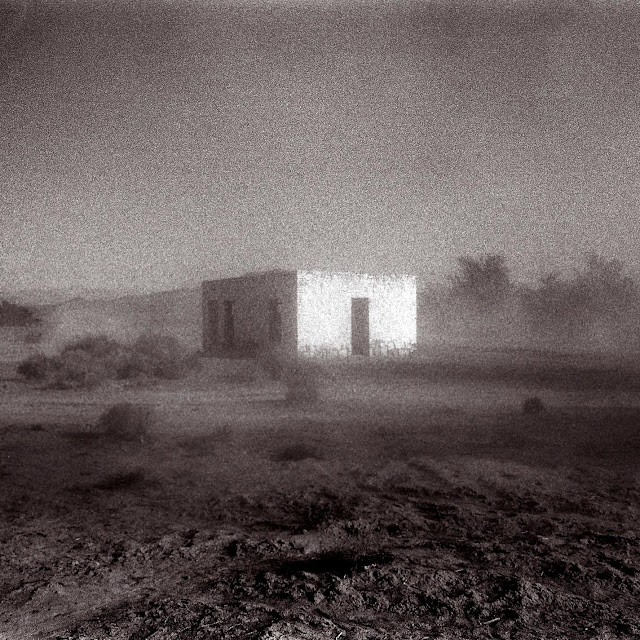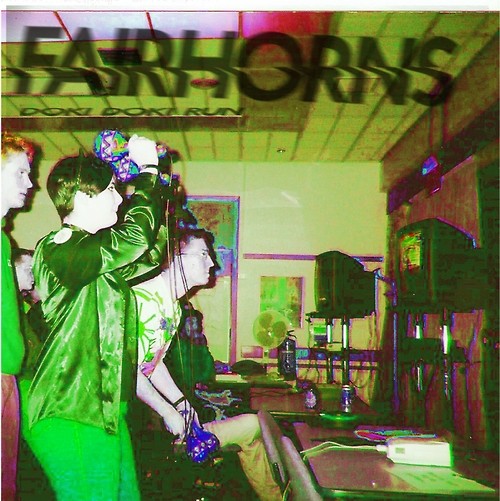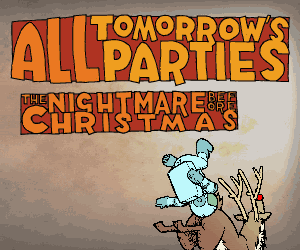
Prepare to meet your new favourite band: two parts Swedish, one part New Yorker, songwriters behind Britney’s Toxic and fond supporters of genetically engineered horned rabbits. Front man Andrew Wyatt talks tales of the Jackalope, pop controversy and Oasis growing old and going through the motions...
Dots: Your Myspace page features a rabbit with horns. Have you been fiddling with genetics as well as knobs and keyboards?
Andrew Wyatt: Well, it’s not us directly but we as a band have invested in a genetic replicating organisation. They helped the pioneers of cloning and they were the ones who came up with the whole Jackalope concept. They’re based in Silicon Valley and they do a load of genetic research. So the horned rabbit is a living legend. We’re trying to kill two birds with one stone in a sense, getting a logo for Miike Snow and then also promoting our stakes in the company.
Dashes: Given your American roots and Pontus and Christian being of Swedish descent, is it naïve to class Miike Snow as a conventional band?
AW: We would I guess because we don’t spend much time at home right at this moment in time. We’ve really become a band; because we were in different places to begin with, once you insert yourself into the maelstrom of performance and promo you’re never really at home anyway.
Dots: Have you ever done an interview that’s skirted around Christian and Pontus’ masterpiece, Toxic?
AW: Yeah, we’ve done a bunch. It’s probably about half and half.
Dashes: Has it been damaging to the career of Miike Snow thus far or vice versa?
AW: To be honest, I don’t think it has mattered one way or the other; speculating whether it’s something completely different or not is kind of a mute point as it is doubtlessly something entirely different, being judged on its own merits. Most of the people aware of Miike Snow solely know of the songs that they’ve been fed by blogs. Those kinds of ancillary things don’t matter so much unless you’re Timbaland or Kanye West, who’ve already promoted themselves and have publicists to jumpstart their careers.
Dots: Do you wish you had it for yourselves in your own setlist?
AW: It could be if we wanted it to but I don’t think it’s musically relevant at this point...
Dashes: What can the UK expect following the aftermath of Animal?
AW: It seems to be going well and there’s a load of enthusiasm surrounding the next single, Black and Blue, which we just finished shooting the video for. Working the festivals has worked for us as before you classify us you should come down and catch the live show because there’s a load of dimensions there that don’t exist on the album. For example, we play the songs for a lot longer, for eight or nine minutes. They’re pretty much twelve inch cuts of our songs.
Dots: The instrumentation featured particularly on Animal and Burial sound androgynous in the sense that it’s almost impossible to decipher what’s being played when and how much instrumentation there actually is...
AW: There’s not much but I think the thing is those songs didn’t really need anything else and its success lies in its simplicity. And live, rather than cowering behind laptops we do everything live; no laptops, all the synths are sequenced and played out there and then. We pretty much utilise the technology of the seventies on stage, we don’t have anything computerised.
Dashes: Predominantly, this is an introduction to Miike Snow for most. In the live setting, do you feel that your six members detract from the band dynamic that would otherwise exist?
AW: I don’t think so; one of the guys is Pontus’ brother, another played the drums on the record and has been friends with Pontus and his brother for years so we’ve got something of a band vibe. Maybe I’m the one on the fringes as it were.
Dots: How did your integration come about?
AW: I met Christian in New York in 2005 in a studio whilst I was writing and producing other people and we just kept in touch. Then I happened to be in Sweden for another project and we got together and went from there. We’ve had a great dynamic as individuals and people so being in a band’s something we were all desperate to get back to ever since we’ve got increasingly busy as producers. They gave me a ring and because I’ve got so much respect for them as musicians, I could hardly turn it down. We honestly didn’t feel it was going to blow up nor get a load of attention, we just wanted to do it and put the project on Myspace. We just wanted to make some cool shit and then people we’d worked with in the industry were begging to hear it and that takes us up to now.
Dashes: The majority of the people aware of Miike Snow this side of the pond it seems learned of you through blogs, predominantly perhaps through your remixes, from Vampire Weekend to Passion Pit. Where is the true domain for Miike Snow when comparing remixing to original material?
AW: I don’t think there needs to be segregation between those two worlds, it’s just that our sound that resonates in our own work carries over when we remix other people’s work. Of course the priority is to conjure up our own material but in a day and age where so much remixing is being done, there’s so much interest in it and it serves as another yardstick to demonstrate popularity. We enjoy putting out remixes and I don’t see why we shouldn’t as long as we like the original version.
Dots: Would you classify yourselves as a straight-up pop act, distinctly rooted in the genre?
AW: Certainly that seems to be how we’ve been seeing things for a while and that may have shaped our perspective. What can be said about this record is that the songs are strongly structured, the lyrics are for the most part fairly straightforward and the melodies are prominent so I guess those traits are all attributed to pop music. Having said that, I don’t necessarily see the word pop to be dirty in any way.
Dashes: Does pop still have its controversies away from Britney’s botox and hair loss?
AW: I wouldn’t necessarily say that Miike Snow is straight pop music as it doesn’t conform to certain criteria as pop seems often to do, it’s just the music that we naturally make rather than something engineered to become popular. I think the current problem with American pop is that everything that makes it to the radio was engineered specifically to be on the radio, done so in a very transparent manner and so therefore there’s something rather soulless about most of it so if there is controversy in pop music, it doesn’t exist in America. Take Klaxons for instance, they were colossal although their music was incredibly irreverent and I see those guys as being in some way truly out of control. Jamie’s kind of a friend and I think they bring something to the table which is in fact frightening and dangerous and that’s controversy.
Dots: Sticking with pop music, playing V Festival this weekend surrounded by British pop currently clogging the airwaves, what are your expectations?
AW: I really don’t know much about the festival itself but what I would say is that when we play live, all of our instruments could break at any one moment as they’re so old and I think that I try to contact a Shamanistic, pagan ritual all the time as the front man. I try to lose consciousness and evaporate time so you won’t find me transfixed by Liam Gallagher and Oasis. We played a festival with them and I was disappointed to see that they’ve hardly regenerated at all. He dances a little, stands in front of the mic and seems to be going through the motions with his eyes on the pay check. Which is a shame because in the early nineties they were the shit.
Miike Snow's debut self-titled LP is released on 26th October.























